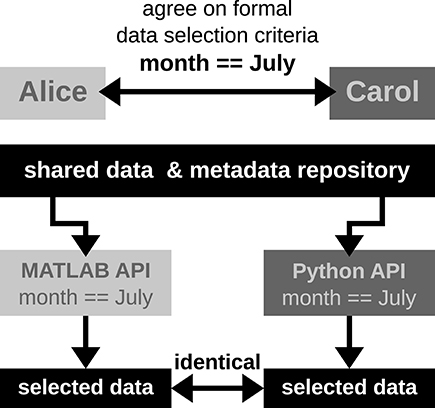Difference between revisions of "Template:Article of the week"
Shawndouglas (talk | contribs) (Updated article of the week text.) |
Shawndouglas (talk | contribs) (Updated article of the week text.) |
||
| Line 1: | Line 1: | ||
'''"[[Journal: | <div style="float: left; margin: 0.5em 0.9em 0.4em 0em;">[[File:Fig4 Zehl FrontInNeuro2016 10.jpg|240px]]</div> | ||
'''"[[Journal:Handling metadata in a neurophysiology laboratory|Handling metadata in a neurophysiology laboratory]]"''' | |||
To date, non-reproducibility of neurophysiological research is a matter of intense discussion in the scientific community. A crucial component to enhance reproducibility is to comprehensively collect and store metadata, that is, all information about the experiment, the data, and the applied preprocessing steps on the data, such that they can be accessed and shared in a consistent and simple manner. However, the complexity of experiments, the highly specialized analysis workflows, and a lack of knowledge on how to make use of supporting software tools often overburden researchers to perform such a detailed documentation. For this reason, the collected metadata are often incomplete, incomprehensible for outsiders, or ambiguous. Based on our research experience in dealing with diverse datasets, we here provide conceptual and technical guidance to overcome the challenges associated with the collection, organization, and storage of metadata in a neurophysiology [[laboratory]]. ('''[[Journal:Handling metadata in a neurophysiology laboratory|Full article...]]''')<br /> | |||
<br /> | <br /> | ||
''Recently featured'': | ''Recently featured'': | ||
: ▪ [[Journal:ISO 15189 accreditation: Navigation between quality management and patient safety|ISO 15189 accreditation: Navigation between quality management and patient safety]] | |||
: ▪ [[Journal:Compliance culture or culture change? The role of funders in improving data management and sharing practice amongst researchers|Compliance culture or culture change? The role of funders in improving data management and sharing practice amongst researchers]] | : ▪ [[Journal:Compliance culture or culture change? The role of funders in improving data management and sharing practice amongst researchers|Compliance culture or culture change? The role of funders in improving data management and sharing practice amongst researchers]] | ||
: ▪ [[Journal:A review of the role of public health informatics in healthcare|A review of the role of public health informatics in healthcare]] | : ▪ [[Journal:A review of the role of public health informatics in healthcare|A review of the role of public health informatics in healthcare]] | ||
Revision as of 17:23, 13 February 2018
"Handling metadata in a neurophysiology laboratory"
To date, non-reproducibility of neurophysiological research is a matter of intense discussion in the scientific community. A crucial component to enhance reproducibility is to comprehensively collect and store metadata, that is, all information about the experiment, the data, and the applied preprocessing steps on the data, such that they can be accessed and shared in a consistent and simple manner. However, the complexity of experiments, the highly specialized analysis workflows, and a lack of knowledge on how to make use of supporting software tools often overburden researchers to perform such a detailed documentation. For this reason, the collected metadata are often incomplete, incomprehensible for outsiders, or ambiguous. Based on our research experience in dealing with diverse datasets, we here provide conceptual and technical guidance to overcome the challenges associated with the collection, organization, and storage of metadata in a neurophysiology laboratory. (Full article...)
Recently featured:










